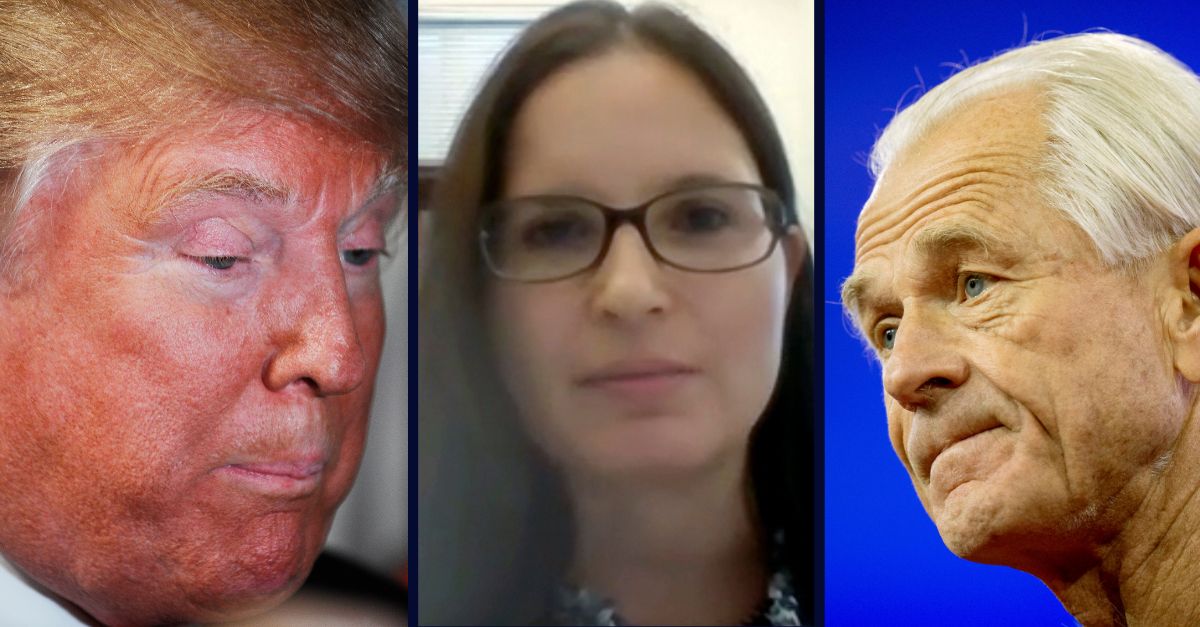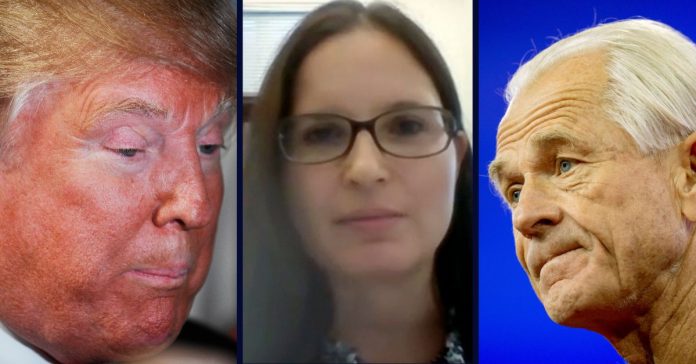
Left to right: Donald Trump speaks to the media for campaign event Saturday, Feb. 13, 2016, in Greenville, S.C. (AP Photo/Rainier Ehrhardt); Aileen M. Cannon speaks remotely during a Senate Judiciary Committee oversight nomination hearing to be U.S. District Court for the Southern District of Florida on July 29, 2020 (U.S. Senate via AP); Peter Navarro, former director of the White House National Trade Council, speaks during the Conservative Political Action Conference, CPAC 2024, at National Harbor, in Oxon Hill, Md., Saturday, Feb. 24, 2024. (AP Photo/Alex Brandon)
As U.S. District Judge Aileen Cannon presides over Donald Trump’s classified documents trial in Florida, a ruling emerged Monday from an appeals court in Washington, D.C., involving Trump’s onetime adviser — the now imprisoned Peter Navarro — that may warrant their attention.
The ruling is a 4-page per curiam judgment from the U.S. Court of Appeals in the District of Columbia. It affirms a lower court’s opinion that Navarro cannot argue, effectively, that he was permitted to flout rules for the return of documents. The Presidential Records Act, or PRA, dictates how he was to treat them and his argument to keep this case alive was rejected.
The documents in question are associated with a ProtonMail account Navarro used while he was working as an adviser at the Trump White House.
Under the PRA, Navarro was considered a “covered” employee, meaning under the law, he is forbidden from sending, receiving, forwarding or otherwise creating presidential records using nonofficial means. The exception would be if he sent an unofficial message and copied his official account or another official no later than 20 days later and then, still, return records at the end of tenure.
This February, while Navarro was already sentenced to prison on his separate contempt matter tied to his refusal to comply with the Jan. 6 committee request for records, a judge threatened to hold him in contempt of court if he refused to provide a sampling of records he insisted were privileged under PRA. As Law&Crime previously reported, some of the records that piqued the judge’s interest were tied to the 2020 election and Navarro’s advocacy of bogus claims of election fraud.
Though the opinion Monday is short, it explains that from 2017 to 2021, Navarro sent at least one message through an unofficial account that was ultimately considered a presidential record by a lower court. He did not, as the law compelled him, copy those messages over to any official accounts. Instead, by 2021 when the Archivist of the United States asked him to hand over records associated with the account, he didn’t respond.
A tug-of-war ensued between Navarro and prosecutors at the Archives and Justice Department for roughly a year before finally, through his attorney, Navarro declared that within the boundaries the Archives had sent for the “presidential records,” he turned up about “200 to 250” documents out of 1,700 that fit the PRA bill.
But Navarro still refused to comply with a request for the records unless he was guaranteed they would not be used against him for his separate contempt of Congress case. Navarro lost his motion to dismiss for failure to state a claim, and he lost an emergency motion for stay pending appeal.
As he serves a four-month prison sentence on two counts of contempt of Congress, this matter too will remain on his plate.
“The district court proceeded to oversee the production of relevant documents, which remains ongoing and disputed,” they wrote.
In his defense, Navarro argued that the government’s use of the District of Columbia’s replevin statutes, or laws governing the taking back of property, were improper because “the PRA itself has no express cause of actions for the United States to seek the return of the Presidential records.”
This argument was too late to raise at this stage, a citation in the order noted. Further, Navarro’s contention that the only real enforcement mechanism the government has on documents is to fire or discipline current employees who violate preservation rules, was meritless.
For this logic to prevail, Navarro would have to show that the PRA itself totally sidesteps the federal government’s greater authority to pursue basic legal remedies for itself.
“Navarro cannot do so,” the per curiam order states.
An attorney for Navarro did not immediately respond to request for comment Monday.
As it pertains to Trump, the order mentions that “the PRA does not explicitly address whether and how the United States may seek return of Presidential records.”
Trump and his attorneys have argued at length in his classified documents case in Florida that the PRA affords him the right to keep records, no matter how classified or sensitive, at his Mar-a-Lago property, so long as he declares them his personally.
This amorphous yet de facto clawing back of records is just one premise Trump has tried to advance as he has sought to dismiss his indictment there despite the fact that the PRA does not have any language in it designating such authority.
The PRA was passed after the Watergate scandal in a specific attempt to restrain how presidents could keep publicly owned records private.
In March, as Law&Crime reported, Cannon left legal analysts downright astonished with her decision to leave language in prospective jury instructions in the case stating that the PRA effectively entitled Trump to turn classified documents into his personal items.
A trial date in Florida has yet to be set. Special counsel Jack Smith can only seek to appeal the prospective jury instructions set out by Cannon once they are formally ordered. Cannon has come under fire before for her decision-making in the Florida case before and could be flirting with a call for her removal from the case.
Have a tip we should know? [email protected]

